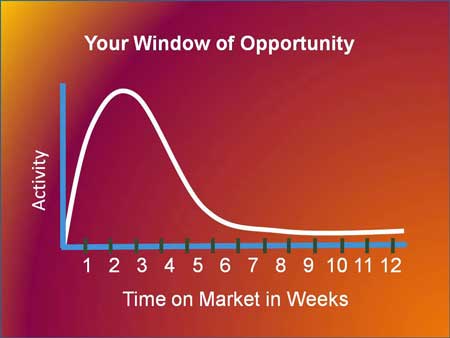‘Ok,’ said Bob, the seller, ‘I get what you’re saying. This is a great time to buy and the loss in value I might have with this place will be more than offset by the greater loss in the house we buy. But, still, I want to get every dime I can out of this place in the process.’
‘And of course, that’s one of the reasons you called Help-U-Sell,’ Said Broker Al. ‘We’re going to help you do that by saving you some commission expense.’
‘Right,’ answered Bob, then glancing over to Carol. ‘But I want to start higher than $285,000. I mean, I can always come down . . . and who knows? Maybe next week you’ll come by with someone who falls in love with the place and is willing to pay more!’
Al tried not to make a face . . . but he was unsuccessful. ‘How much more?’ he asked.
‘Why don’t we start at, say: $350,000. People are going to make offers anyway, and like I said, we can always come down.’
‘There are at least half a dozen reasons why that’s not a good idea,’ said Al. ‘Let me share just a couple.’
‘Oh, sure, Al,’ chimed in Carol, ‘You’re the broker. Your job is to get this listing as low as possible, right?’
‘Not at all. My job is to get you the best transaction we can pull from the market, which means: best price, most walkaway dollars and a minimum of surprises and inconvenience for you. My job is also to save you money over what you’d pay an ordinary agent.’ Al was taken aback and it showed. How could they be this far into the process and the sellers not trust him? Carol saw his discomfort.
‘Oh, come on, Al,’ she chirped, reaching out and grabbing his knee for a moment, ‘I was just teasing. Go ahead, tell us why we shouldn’t try to get more.’
‘Well first there’s the appraisal. Unless we get a cash buyer — which is pretty unlikely — the lender is going to insist on an appraisal and they will only make a loan based on the value reported in the appraisal. Now, I’m not an appraiser, but they work with the same information I used to do your market analysis, the same comps, prices, days on market . . . and they’re almost certainly going to get the same result I got: Something between $275 and $285.’ Al took a moment to let that sink in. ‘Can you see how the appraisal keeps people from over-paying for a house?’
‘Well, yeah,’ said Bob, ‘but still, we can always come down.’
‘If you get a chance,’ interrupted Al. ‘Here; take a look at this.’ He again pulled at a laminated sheet in his clipboard.

‘You have a narrow Window of Opportunity when you first put your home on the market. The day it hits, there is a bucket of potential buyers out there for whom it might be perfect. They’ve been in the market for awhile and they’ve seen everything that’s out there. Your house is fresh and new and they’re all going to want to see it. Really: the first month your house is on the market is when the greatest traffic — and therefore the greatest chance of getting a good offer — occurs. After that, the backlog of people who have been waiting for a house just like yours to come up is gone, and you’re left with just new buyers trickling into the market.’ Al paused and looked over at Bob and Carol. They were leaning forward over the table, studying the graph.
‘What happens when you overprice,’ continued Al, ‘is that you hit the wrong bucket.’
‘Huh?’ said Carol, her brow knit and her head cocked to the side.
‘If you price at $350, you’re going to find that backlog of buyers who have been looking at $350,000 houses all along, and to them, you house is going to look like less than what they’ve been seeing for the same price. Your house might actually convince them that that bigger house a few miles away is a pretty good deal after all.’ Al noticed that Bob was starting to nod. Yes! he thought, He’s with me!
‘The people who are looking for a house like yours are probably never going to see it.’ Al said . . . and shut up waiting for a reaction.
‘What do you mean?’ asked Carol.
‘ People looking in the high $200’s — which is where your home will probably sell — will have told their agents not to go over $300, and they’ll never even see that your house is on the market. And if they do stumble across it by accident, it’s just going to look overpriced to them.’ Al took a breath and sat back. The defense rests, he thought.
Finally Carol chimed in. ‘You know, Bob, he’s right. I remember when we were looking for this place. After awhile I could tell when something was overpriced. Couldn’t you?’
. . . to be continued . . .

One thought on “Pricing Clinic 2: I can always come down”